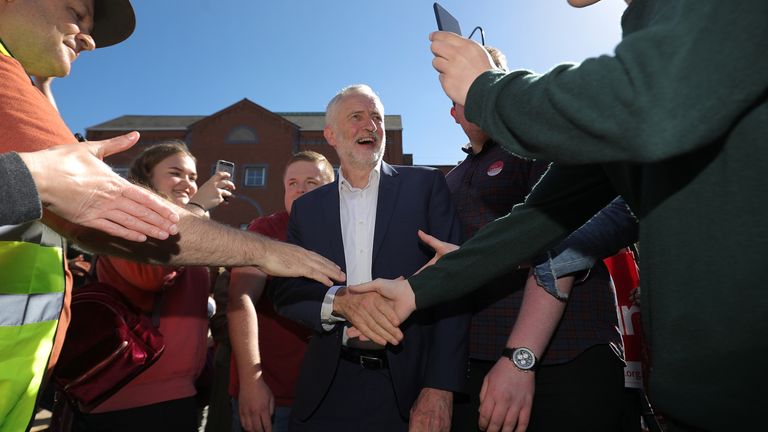Sky Views: Can PM keep UKIP and Lib Dem defectors happy?

Tuesday 2 May 2017 10:08, UK
Faisal Islam, Political Editor
The single most important thing in the General Election campaign so far has been the "great reunification on the right of politics".
That strategy is put to the test today on the PM's tour of the South West.
Depending on which poll you believe (or don't believe), the broad electoral meteorology is consistent.
Since Brexit, and especially since the triggering of Article 50, a large proportion of UKIP voters have switched allegiances to the Conservatives.
Some pollsters put the total as high as two-thirds - and that's over two million, perhaps nearly three million votes.
Alone, this takes the Conservative vote share into the mid-40s, from 37% in 2015.
National vote share, of course, means very little. What matters is where these ex-UKIP voters are, and how many are in marginal seats.
In theory, it puts almost all the top 75 Tory targets (by majority) in range of a win, from Chester to Dewsbury to Hartlepool.
If you throw in a bit of seepage from Labour to the Lib Dems over Brexit, then constituencies with 5,000 majorities - such as Birmingham Erdington - also come into play.
So far, so good for the PM.
It was, of course, Copeland that provided the template here. UKIP's vote fell from 16% to 6%. The Conservatives were up from 36% to 44%. And Labour went from 42% down to 37% - meaning they lost the long-held seat.
Triggering Article 50 has provided a decent rationale for this flow of a large number of votes.
On top of this, UKIP is withdrawing its candidates in a number of Conservative seats to consolidate the Brexit vote.
The Leave vote is beginning to concentrate on the Conservatives. Remain supporters are far more evenly spread.
But the sharp spike in this move has been relatively recent - over the past few weeks. The question is whether it will last.
Right now, the very high Conservative polling numbers reflect a coalition of voters that seems to be incoherent. Mrs May has attracted many UKIP voters, but has kept all of the liberal Conservatives and Lib Dem switchers who were responsible for the 2015 General Election win.
It took a huge amount of discipline and focused effort for the Conservatives to take 27 Lib Dem seats in 2015.
Those seats had been long chosen as targeted seats, and it is where David Cameron focused his campaigning, it is where the battle bus campaign concentrated, and such seats were subject to intensive micro-targeting of messages designed to reassure Lib Dem voters on pensions, the NHS and schools.
So far in the 2017 campaign, Theresa May's efforts have been focused in Lancashire, Yorkshire, and Wales - seats where the Conservatives think they can win big directly against Labour.
Today, the PM will hit the South West for the first time, trying to consolidate those 2015 gains.
She says she does not want to rerun old arguments and move beyond "remain" and "leave".
Writing in the Western Morning News she said: "I am determined not to allow parties like the Liberal Democrats to prosper, because it is in their interests to prop up a Corbyn coalition of chaos so that the Brexit process stalls and they can reopen the battles of the past."
Mrs May goes on to say it was voters in the South West who "were the difference between a strong, majority government and a weak, unstable coalition of Labour, the Liberal Democrats and the SNP".
The choice of where the Conservatives choose their target seats will be fascinating. It might make some sense to concentrate on the Labour battleground, rather than the Lib Dem one.
The same methods used to turn Lib Dem voters Tory where it mattered are surely now being deployed on UKIP voters. But there are risks here too.
The level of detail in the manifesto will also be revealing. Will it focus on consolidating these UKIP switchers with solid promises on Brexit negotiation red lines?
The very high Conservative polling numbers reflect a coalition that could yet break. The more the PM chases and seeks to consolidate the votes of UKIP supporters, the greater the potential to lose former Lib Dem ones.
This strategy only really works because of perceptions of the PM's relative strength, leadership and competence versus Jeremy Corbyn.
Against a backdrop of absolute majority support, suggested in recent polls for both single market (51%) and customs union (57%) membership, there is still some scope for opposition parties to detach some of the 2015 Conservative vote away.
Whether Jeremy Corbyn can or will do that, is, of course, another matter. The same goes for repeating 2015's uncompromising squeeze of Lib Dem supporters. Five weeks is still a long period to sustain this coalition.
Sky Views is a series of comment pieces by Paste BN editors and correspondents, published every morning.
Previously on Sky Views: Hannah Thomas-Peter - America is infuriating - but I love it



